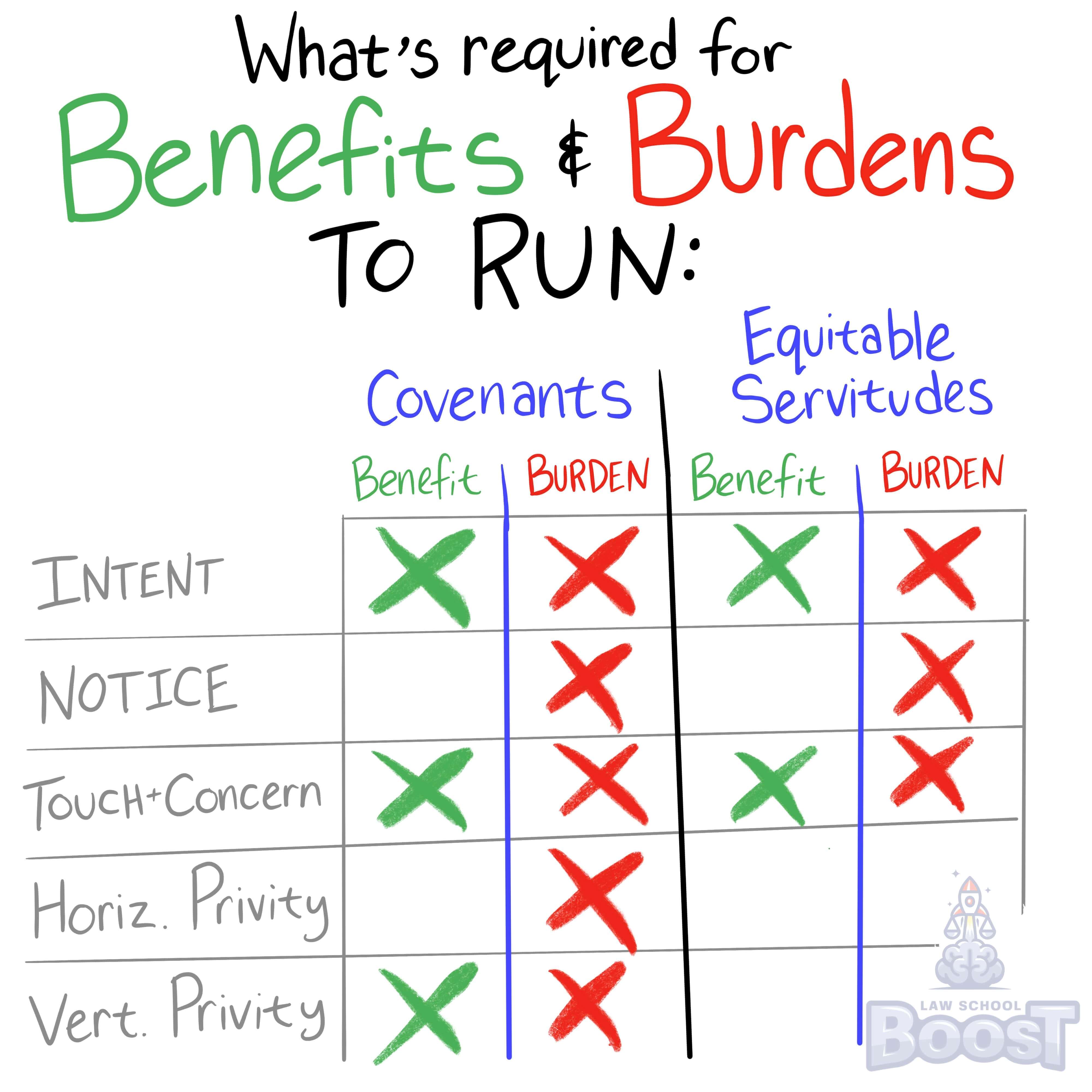😀
Real Property • Real Covenants
PROP#143
Legal Definition
A CLUE
Defenses to enforcement of an equitable servitude include:
1. Acquiescence
2. Change in Neighborhood
3. Laches
4. Unclean hands
5. Estoppel
Defenses to enforcement of an equitable servitude include:
1. Acquiescence
2. Change in Neighborhood
3. Laches
4. Unclean hands
5. Estoppel
Plain English Explanation
There are 5 equitable defenses against enforcement of an equitable servitude:
(1) Acquiescence, which means reluctant acceptance of something without protest. In other words, if someone breaches an equitable servitude, and the party who benefits from the equitable servitude decides not to do anything about it, the law will consider the servitude abandoned. It's the legal version of "use it or lose it".
(2) Change in Neighborhood, which means that if the surrounding neighborhood changes enough over time, it may terminate an equitable servitude. For example, if Amy sells Whiteacre to Bob with the covenant that Whiteacre must never be used for commercial development, the courts may not enforce it if 20 years later the surrounding neighborhoods have turned into a heavily commercialized development area.
(3) Laches, which means an unreasonable delay in trying to enforce your right under a breach of servitude. This is similar to acquiescence, where if you don't use it, you lose it.
(4) Unclean Hands, which happens when someone is hypocritically trying to enforce a servitude on their neighbor's land, which they themselves are also violating. For example, if neither Amy or Bob are allowed to have trampolines on their property, but they both do, when Bob tries to force Amy to get rid of hers, a court will view the fact that Bob is also violating the covenant as a reason to not help him out.
(5) Estoppel, which means if the person who benefits from the covenant makes it appear as if they have abandoned it, then the court will consider it actually abandoned if a person burdened by the covenant detrimentally relies on the belief that it is no longer in effect.
(1) Acquiescence, which means reluctant acceptance of something without protest. In other words, if someone breaches an equitable servitude, and the party who benefits from the equitable servitude decides not to do anything about it, the law will consider the servitude abandoned. It's the legal version of "use it or lose it".
(2) Change in Neighborhood, which means that if the surrounding neighborhood changes enough over time, it may terminate an equitable servitude. For example, if Amy sells Whiteacre to Bob with the covenant that Whiteacre must never be used for commercial development, the courts may not enforce it if 20 years later the surrounding neighborhoods have turned into a heavily commercialized development area.
(3) Laches, which means an unreasonable delay in trying to enforce your right under a breach of servitude. This is similar to acquiescence, where if you don't use it, you lose it.
(4) Unclean Hands, which happens when someone is hypocritically trying to enforce a servitude on their neighbor's land, which they themselves are also violating. For example, if neither Amy or Bob are allowed to have trampolines on their property, but they both do, when Bob tries to force Amy to get rid of hers, a court will view the fact that Bob is also violating the covenant as a reason to not help him out.
(5) Estoppel, which means if the person who benefits from the covenant makes it appear as if they have abandoned it, then the court will consider it actually abandoned if a person burdened by the covenant detrimentally relies on the belief that it is no longer in effect.
Visual Aids

Related Concepts
How is an equitable servitude created?
How is an equitable servitude terminated?
How may a covenant be terminated?
In assessing an equitable servitude, when will a benefit run with the land?
In assessing an equitable servitude, when will a burden run with the land?
In assessing real covenants, how will courts treat racially restrictive covenants?
In assessing whether a real covenant will run with the land, what constitutes intent?
In assessing whether a real covenant will run with the land, what constitutes notice?
In assessing whether a real covenant will run with the land, what is horizontal privity?
In assessing whether a real covenant will run with the land, what is touch and concern?
In assessing whether a real covenant will run with the land, what is vertical privity?
What is an equitable servitude?
What is a real covenant?
What is required for a benefit to run with the land?
What is required for a burden to run with the land?
What is the remedy for breach of an equitable servitude?
When may an equitable servitude be implied?
Which covenants always run with the land?


